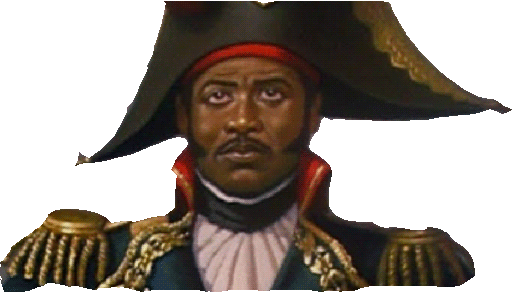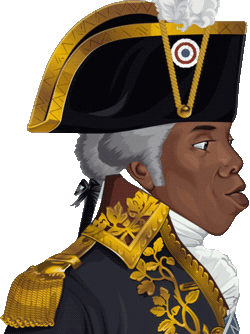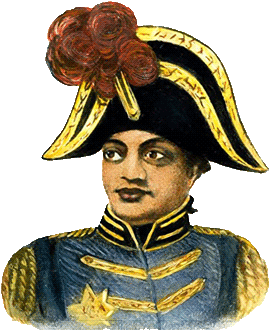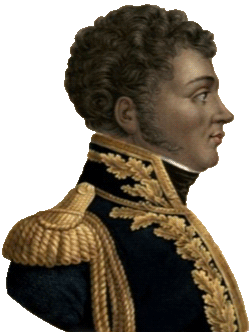Toussaint Louverture, although a self-educated former domestic slave, was one of the
most successful black commanders. Like Jean François and Biassou, he initially
fought for the Spanish crown. After the British had invaded Saint-Domingue,
Louverture decided to fight for the French if they would agree to free all the
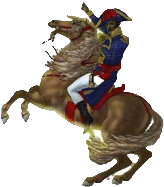 slaves. Sonthonax had proclaimed an end to slavery on 29 August 1792. Louverture
worked with a French general, Étienne Laveaux, to ensure that all slaves would
be freed. Louverture abandoned the Spanish army in the east and brought his
forces over to the French side on 6 May 1794 after the Spanish refused to
take steps to end slavery.
Pellentesque pellentesque tincidunt dignissim. Praesent vehicula est turpis. Lorem ipsum
dolor sit amet. consectetur adipiscing elit. Vivamus luctus lacus non risus molestie,
fringilla aliquet ante euismod. Sed eget purus lacus. Aenean tempus vitae augue
vel dapibus. Pellentesque pellentesque tincidunt dignissim. Praesent vehicula
est turpis.
slaves. Sonthonax had proclaimed an end to slavery on 29 August 1792. Louverture
worked with a French general, Étienne Laveaux, to ensure that all slaves would
be freed. Louverture abandoned the Spanish army in the east and brought his
forces over to the French side on 6 May 1794 after the Spanish refused to
take steps to end slavery.
Pellentesque pellentesque tincidunt dignissim. Praesent vehicula est turpis. Lorem ipsum
dolor sit amet. consectetur adipiscing elit. Vivamus luctus lacus non risus molestie,
fringilla aliquet ante euismod. Sed eget purus lacus. Aenean tempus vitae augue
vel dapibus. Pellentesque pellentesque tincidunt dignissim. Praesent vehicula
est turpis.
The French arrived on 2 February 1802 at Le Cap with the Haitian commander Henri Christophe being ordered by Leclerc to turn over the city to the French.[102] When Christophe refused, the French assaulted Le Cap and the Haitians set the city afire rather than surrender it.[102] Leclerc sent Toussaint letters promising him: "Have no worries about your personal fortune. It will be safeguarded for you, since it has been only too well earned by your own efforts. Do not worry about the liberty of your fellow citizens".[103] When Toussaint still failed to appear at Le Cap, Leclerc issued a proclamation on 17 February 1802: "General Toussaint and General Christophe are outlawed; all citizens are ordered to hunt them down, and treat them as rebels against the French Republic".[104] Captain Marcus Rainsford, a British Army officer who visited Saint-Domingue observed the training of the Haitian Army, writing: "At a whistle, a whole brigade ran three or four hundred yards, and then, separating, threw themselves flat on the ground, changing to their backs and sides, and all the time keeping up a strong fire until recalled…This movement is executed with such facility and precision as totally to prevent cavalry from charging them in bushy and hilly country" (https://en.wikipedia.org/wiki/).
In a letter to Jean-Jacques Dessalines, Toussaint outlined his plans for defeating the French: "Do not forget, while waiting for the rainy reason which will rid us of our foes, that we have no other resource than destruction and fire. Bear in mind that the soil bathed with our sweat must not furnish our enemies with the smallest sustenance. Tear up the roads with shot; throw corpses and horses into all the foundations, burn and annihilate everything in order that those who have come to reduce us to slavery may have before their eyes the image of the hell which they deserve".[104] Dessalines never received the letter as he had already taken to the field, evaded a French column sent to capture him and stormed Léogâne.[104] The Haitians burned down Léogâne and killed all of the French with the Trinidadian historian C. L. R. James writing of Dessalines's actions at Léogâne: "Men, women and children, indeed all the whites who came into his hands, he massacred. And forbidding burial, he left stacks of corpses rotting in the sun to strike terror into the French detachments as they toiled behind his flying columns".[104] The French had been expecting the Haitians to happily go back to being their slaves, as they believed it was natural for blacks to be the slaves of whites, and were stunned to learn how much the Haitians hated them for wanting to reduce them back to a life in chains.[104] A visibly shocked General Pamphile de Lacroix after seeing the ruins of Léogâne wrote: "They heaped up bodies" which "still had their attitudes; they were bent over, their hands outstretched and beseeching; the ice of death had not effaced the look on their faces" .
The Haitians next tried to stop the French at a British-built fort up in the mountains called Crête-à-Pierrot, a battle that is remembered as a national epic in Haiti.[105] While Toussaint took to the field, he left Dessalines in command of Crête-à-Pierrot, who from his fastness could see three French columns converging on the fort.[105] Dessalines appeared before his men standing atop of a barrel of gunpowder, holding a lit torch, saying: "We are going to be attacked, and if the French put their feet in here, I shall blow everything up", leading his men to reply "We shall die for liberty!" (https://en.wikipedia.org/wiki/).
